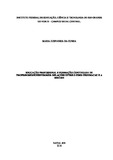Educação profissional e formação continuada de professores/supervisores: relações entre o PIBID IFRN/Macau e a SEEC/RN

Visualizar/
Data
2018-04-06Autor
Cunha, Maria Judivanda
http://buscatextual.cnpq.br/buscatextual/visualizacv.do?id=K4427813U8
Metadado
Mostrar registro completoResumo
This study was developed during the master’s Degree Course in Professional Education through the Post-Graduation Program in Professional Education (PPGEP) at the Federal Institute of Education, Science and Technology of Rio Grande do Norte (IFRN). The Institutional Program for Teachers’ Scholarship, referred to in discussions about teachers’ formation, is exclusively implemented at the Superior Education Institutes – IES. It occurs through agreements with the following Brazilian institution: Aperfeiçoamento de Pessoal de Nível Superior (CAPES). Based on the importance of the referred Program, this work tries to answer the following question: How does PIBID provide spaces for dialogues about Vocational Professional Education for the continuous supervisor teachers’ formation at the Secretary of Culture and Education of Rio Grande do Norte (SEEC/RN) through practices in the Biology College at IFRN/Macau? We aim at analysing the contributions of PIBID for the providence of spaces for continuous supervising teachers’ formation at SEEC/RN through the Program PIBID IFRN/Macau. The theoretical methodological procedure is the education research. It is based on the dialectical historical materialism. The approach is qualitative, and the research is a case study having data collecting and documental analysis and the data collecting tool is the semi-structured interview. The results point out that PIBID has contributed on the building of spaces for continuous supervising teachers’ formation at SEEC/RN through the Program PIBID IFRN/Macau, focusing on Vocational Professional Education. These supervising teachers, from the public state education, manage to foster the interlocution between basic education and superior education at the institutes. They participate in the moments of formation such as the institutional seminars about vocational professional education, the Teaching Graduation National Meetings (ENALIC) at the national forums, the weekly meetings in the federal institutes, among other moments for formation. Therefore, based on the reports from the subjects, we understand that the dialogue about continuous teachers’ formation focusing on the vocational professional education has occurred, however timidly. It reaches the subjects for the initial formation of the students and the continuous supervising teachers’ formation. Both situations are built along the process among the subjects establishing connections with the program.



